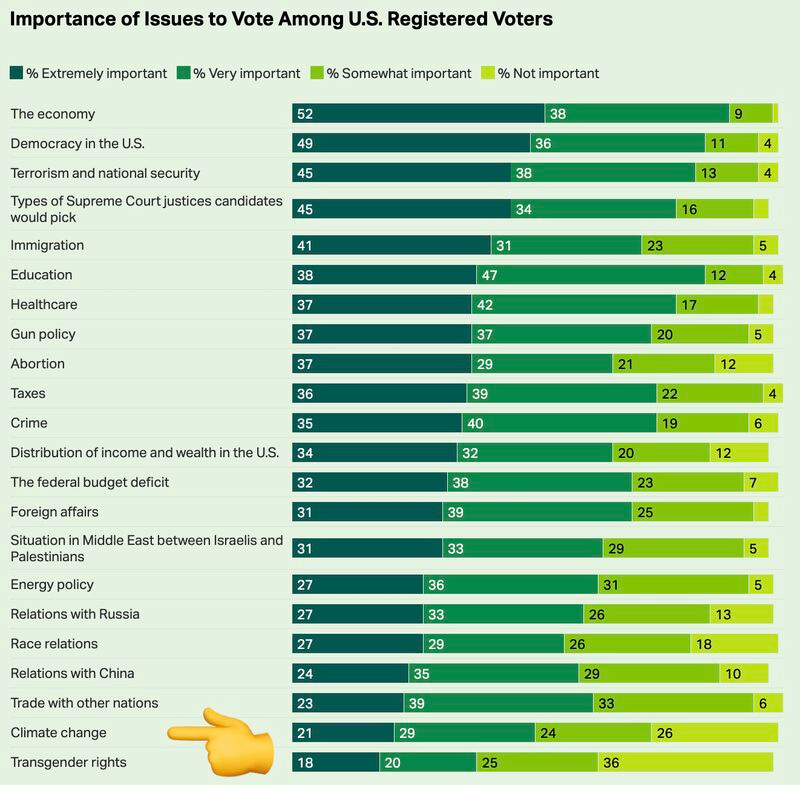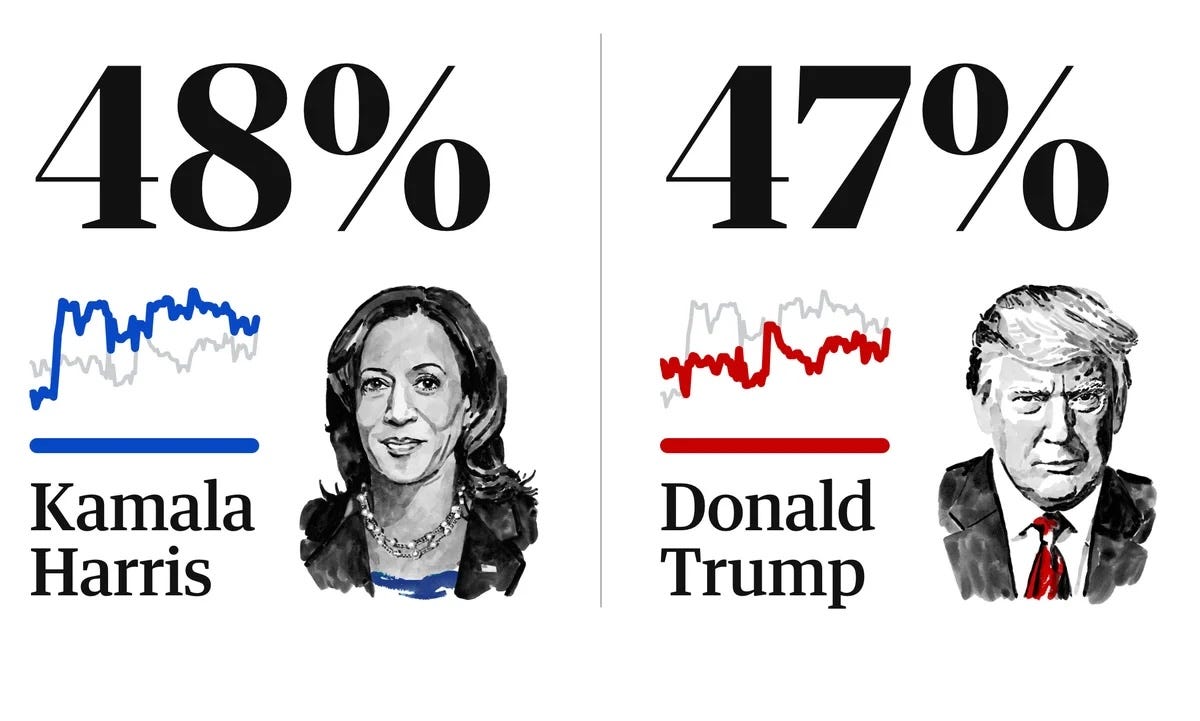TCC #38: What does a Trump victory teach us about corporate sustainability claims?
A MAGA victory shows us what the 'average' consumer cares about.
Photo: AP
Hello friends,
Like many of you, I’ve spent the past week racking my brain to understand how a convicted felon, serial rapist, racist, misogynist — I’ll leave it at that for now — could have so overwhelmingly captured the hearts and minds of the world’s great superpower.
How can a man so embroiled in scandal and so clouded in buffoonery manage not just to scrape by, but to actually dominate?
Scandals have a long and successful history at bringing people down. But the era of scandals as inevitable career-enders may be behind us. Maybe people just don’t care as much as we think they should. What we perceive as disastrous from within our plugged-in political or climate bubbles is often barely a blip on the radar for the average citizen.
Take this analysis from Frank Bruni in the New York Times:
For starters, many voters don’t know about or didn’t really pay attention to all of Trump’s florid ugliness in the final hours. Many voters aren’t plugged in like that. Politics, even presidential campaigns, aren’t in the center of their vision but in its periphery — and irregularly, at that. Those of us who get hourly updates, have nightly freak-outs and can hold forth on Trump and the shark, Trump and Hannibal Lecter, Trump and windmills aren’t normal, but we’re arrogant: We assume our experience is everyone’s and our knowledge ambient.
No. People are busy. People are distracted. People are cynical. They tune out much if not most of this political drama because they regard it, indeed, as theater, as performance, whether it’s Trump’s conniptions or Harris’s “Kumbaya.”
When times are tough, we narrow our focus. The average person today — even in the wealthiest country in the world — cannot see beyond their front yard. (Or, more likely, their rented apartment.) They think in terms of local, not global, problems. They’re worried about what’s affecting them today, and little beyond that. That’s not a criticism; the problems they’re dealing with are big, scary, exhausting problems. There’s not much capacity left for threats that don’t appear to be banging down our front doors.
What does this have to do with corporate sustainability?
Those of us who work in climate often have a hard time acknowledging that there may be bigger or more urgent problems for most people than a 2-3°C rise in global temperatures. The cost of living. Wars breaking out around the world. The threat of a world-ending nuclear war. Autocracy. Women’s rights. Access to a doctor when you need one. The world — even the developed world — has so many real problems that we cannot simply expect every citizen to engage at the level we do on our issue of choice.
Just look at this graph that appeared in my LinkedIn feed right before election day:
(Poll source: Gallup, "Economy Most Important Issue to 2024 Presidential Vote")
I boil down these observations to two key points:
1. The average citizen (let’s stop calling them consumers, eh?) today is simply not as plugged in as we think they are. They don’t see the majority of what we see.
This is true for politics (watch the last 4 minutes of this Jimmy Kimmel video) and also true for sustainability. This morning, I asked a civically engaged, passionate liberal journalist friend if she knew about H&M’s environmental claims scandal. She didn’t. I asked if she’d heard about the problems with cobalt mining. She hadn’t. I asked her about carbon offsets — she’d never heard of them until she met me.
2. If they do see it, they don’t care. They have bigger problems to deal with.
Whether this sponge will biodegrade or this fashion brand is currently being sued pales in comparison to which brand is the cheapest, which brand they feel most connected to, which logo has flashed on their screens the most times in the last six months. A small subset of people may feel more connected to sustainable brands, but I believe this is truly a smaller group than we think.
In 2024, the attention deficit is real; each of us can only care about so many things at once. When so many things seem to be going wrong, eco-friendly toothbrushes and carbon-neutral chicken legs just aren’t going to register.
Either people aren’t seeing what we’re seeing — or they can’t muster up the attention and energy to care.
Either way, what does that mean for those of us who work in climate technology and corporate sustainability? It means we should probably stop raving about how companies should incorporate sustainability because of consumer demand. I know, there’s data to support this — but there was also data to support this:
I’m not saying end consumers don’t care about sustainability at all — but we should be wary of leaning on the ‘consumers care’ argument as a business case for corporate climate action. Not right now.
As long as the rest of the world keeps pushing forward on sustainability, and as long as the Trump administration doesn’t tear down too much of what’s been built to date, it will still be relevant to talk about investors, financial institutions, and regulation as key drivers of climate action.
But I believe we can retire the consumer conversation for now.
This leads me to two questions:
Why incorporate voluntary sustainability actions into business practices at all?
Why talk about it (voluntarily)?
And two answers:
Do it because it’s the right — and therefore the only — thing to do.
Don’t talk about it for the sake of consumers (or even investors or regulators). Talk about it for your industry. Show the others what’s possible.
In all the talk about sustainability risk we forgot about responsibility. It is a company’s responsibility to take care of people and planet. Not because of the financial consequences, but because of the actual consequences — because of lakes turned green and toxic and birds drowning in oil and children buried alive while scraping up cobalt for your iPhone.
I think the hope was that talk of climate ‘risk’ would get business leaders to actually pay attention and make climate action mainstream. But I worry that we’ll simply lose sight of what actually matters in all this.
And what matters is not whether people think your brand hurts people or the planet, but whether it actually does.
Maybe a Trump victory is a wake-up call.
Maybe it shows us that we can’t just do all this stuff because we think others will reward us for it.
Maybe it’s a reminder that we do this stuff because it’s what’s right.
Doing the right thing may never be enough to win people over.
We should do it anyway.
“The true test of a man's character is what he does when no one is watching.”
John Wooden





